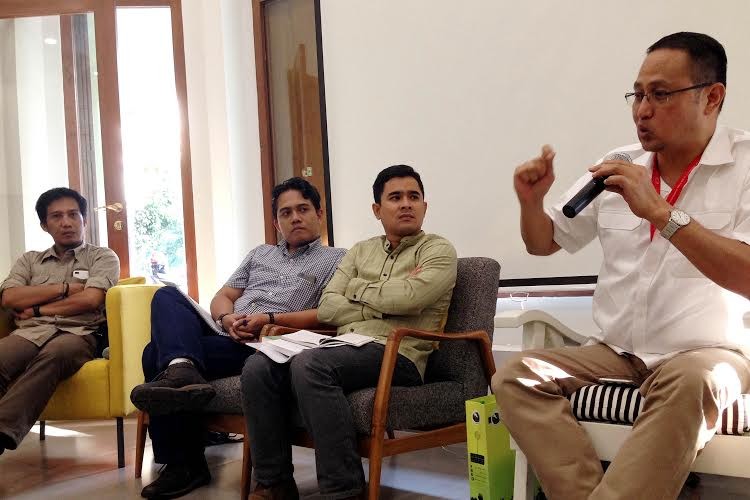Popular Reads
Top Results
Can't find what you're looking for?
View all search resultsPopular Reads
Top Results
Can't find what you're looking for?
View all search resultsExperts call for easing internet censorship
Change text size
Gift Premium Articles
to Anyone
 LBH Pers research and networking division head Asep Komaruddin (from left to right), Institute for Policy Research and Advocacy (ELSAM) researcher Wahyudi Djafar, Alliance of Independence Journalists (AJI) secretary-general Arfi Bambani and former chairman of the Indonesian Internet Service Provider Association (APJII) Semmy Pangerapan speak at a discussion in Jakarta on Wednesday. (thejakartapost.com/Viriya Paramita Singgih)
LBH Pers research and networking division head Asep Komaruddin (from left to right), Institute for Policy Research and Advocacy (ELSAM) researcher Wahyudi Djafar, Alliance of Independence Journalists (AJI) secretary-general Arfi Bambani and former chairman of the Indonesian Internet Service Provider Association (APJII) Semmy Pangerapan speak at a discussion in Jakarta on Wednesday. (thejakartapost.com/Viriya Paramita Singgih)
S
everal media experts have demanded the government ease internet censorship due to the enforcement of the 2008 Information and Electronic Transaction (ITE) Law.
“Every stakeholder should pay attention to this messy law, which has violated the principle of network neutrality, because it could penalize everyone for defamation,” Arfi Bambani, the Alliance of Independence Journalists (AJI) secretary-general, said during a discussion in Jakarta on Wednesday.
Network neutrality principle means that all traffic on the internet should be treated equally. Hence, it promotes the idea of open internet, which upholds transparency and proscribes censorship, he added.
Arfi later criticized a statement made by the Indonesian Muslim Intellectuals Association (ICMI) secretary-general, Jafar Hafsah, who had called on the government to ban YouTube and Google because those websites “have spread pornographic and violent content”.
“For instance, if people make an agreement to be involved with a corruption scandal by phone, could the phone provider be penalized?” Arfi said, responding to Jafar’s statements.
However, Arfi said that the government could indeed ban those websites as stipulated in the 2008 ITE Law. Article 27, paragraph 3 of the law states that people can be criminalized if they deliberately distribute and/or transmit and/or make accessible electronic information or document that contain slanderous and defamatory language.
Former chairman for the Indonesian Internet Service Provider Association (APJII) Semmy Pangerapan also questioned Ministerial Regulation No. 19/2014, which allowed internet service providers (ISP) to directly ban websites carrying negative content.
“The authority to filter the content shouldn’t be given to the ISP, as each of them could have a different policy to ban the content. The government should create standards and implement bans themselves,” Semmy said.
Meanwhile, Institute for Policy Research and Advocacy (ELSAM) researcher Wahyudi Djafar said that the 2008 ITE Law had been used to criminalize at least 127 netizens, particularly for violating articles 27, 28 and 29. Those articles stipulate prohibited acts, including the distribution of content related to pornography, gambling, defamation, extortion, hoax news, hate speech or threat.
“Those matters have already been stipulated in the Criminal Code [KUHP]. So it’s better to bring those articles out of the ITE Law,” Wahyudi said.
The government and the House of Representatives are deliberating the revision of the law. However, it is going to be useless if there is no significant change in the law, Wahyudi said. (vps)









